Unit 5 Nelson Mandel -- a modern hero
文档属性
| 名称 | Unit 5 Nelson Mandel -- a modern hero | 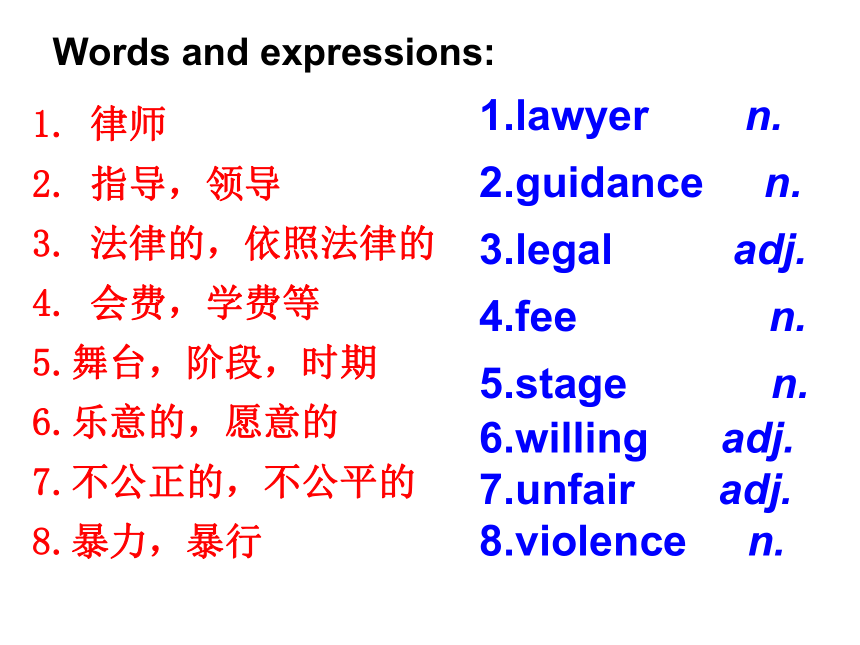 | |
| 格式 | zip | ||
| 文件大小 | 352.6KB | ||
| 资源类型 | 教案 | ||
| 版本资源 | 人教版(新课程标准) | ||
| 科目 | 英语 | ||
| 更新时间 | 2012-11-19 19:38:25 | ||
图片预览

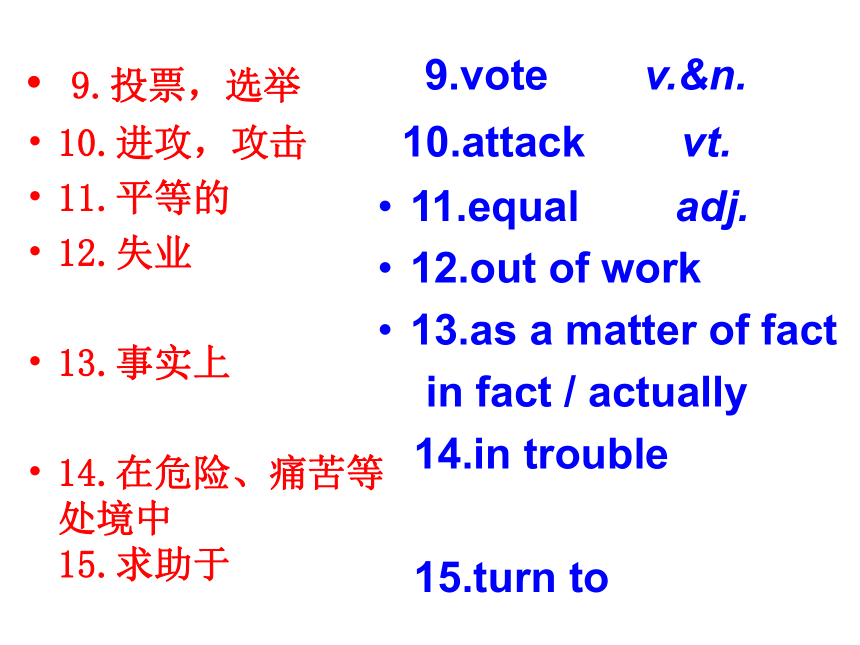

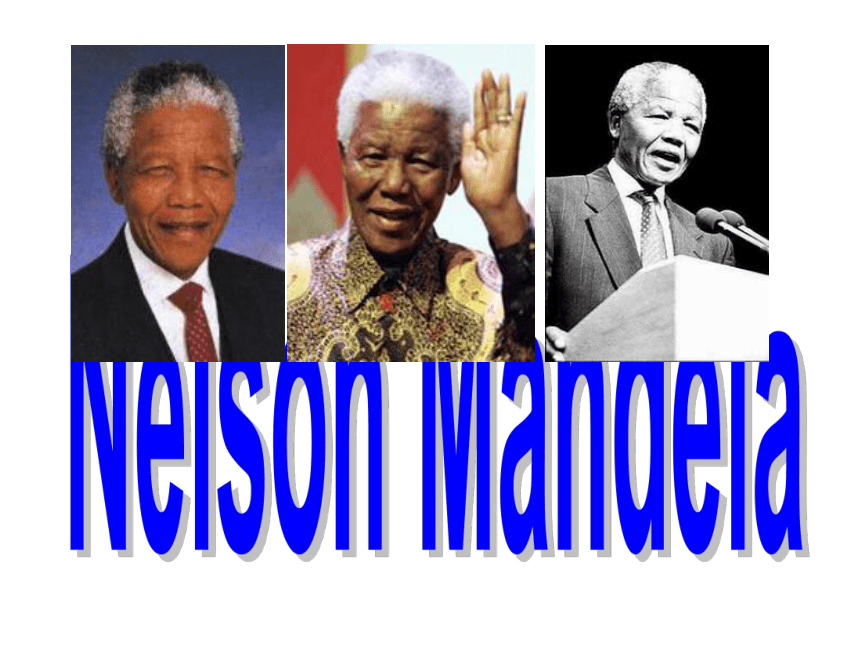
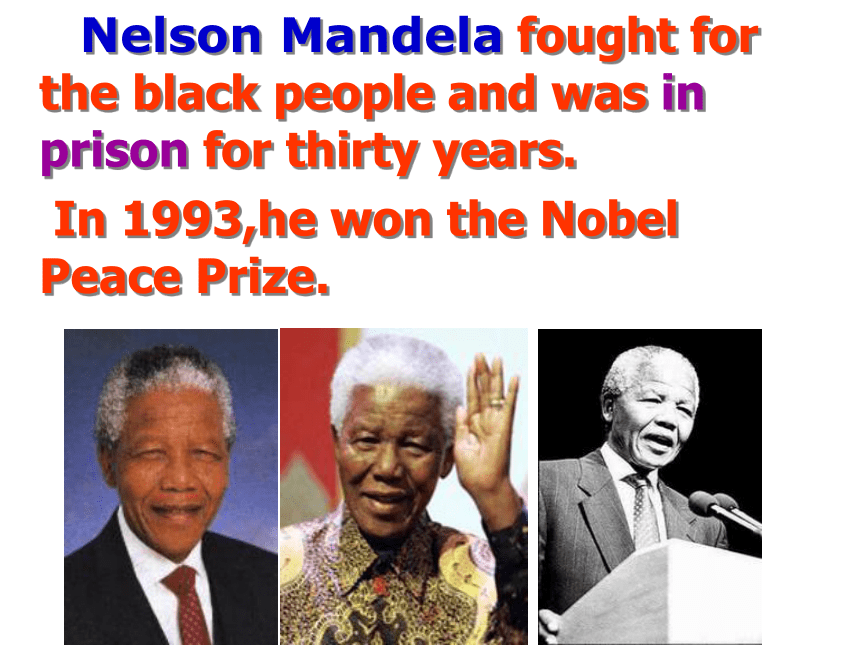
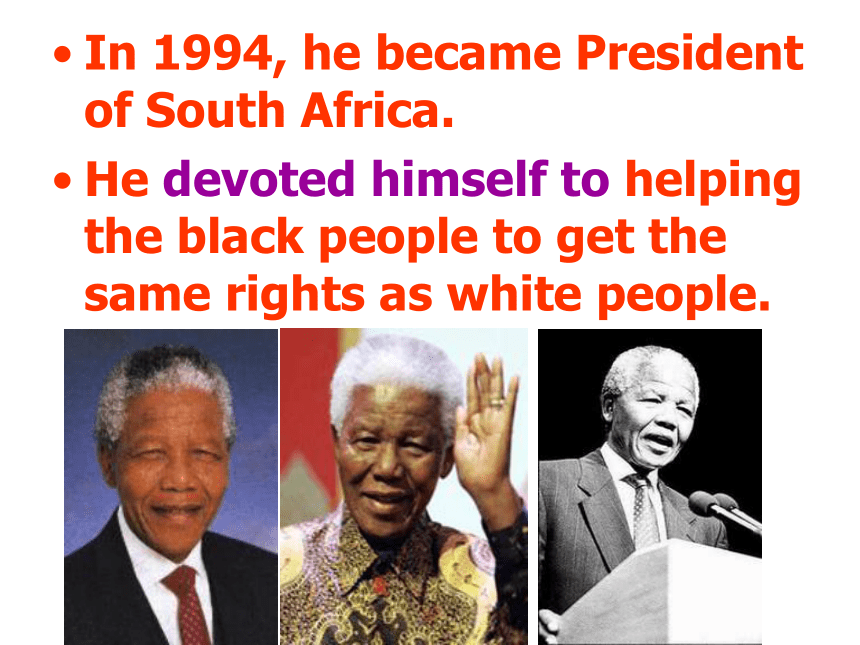
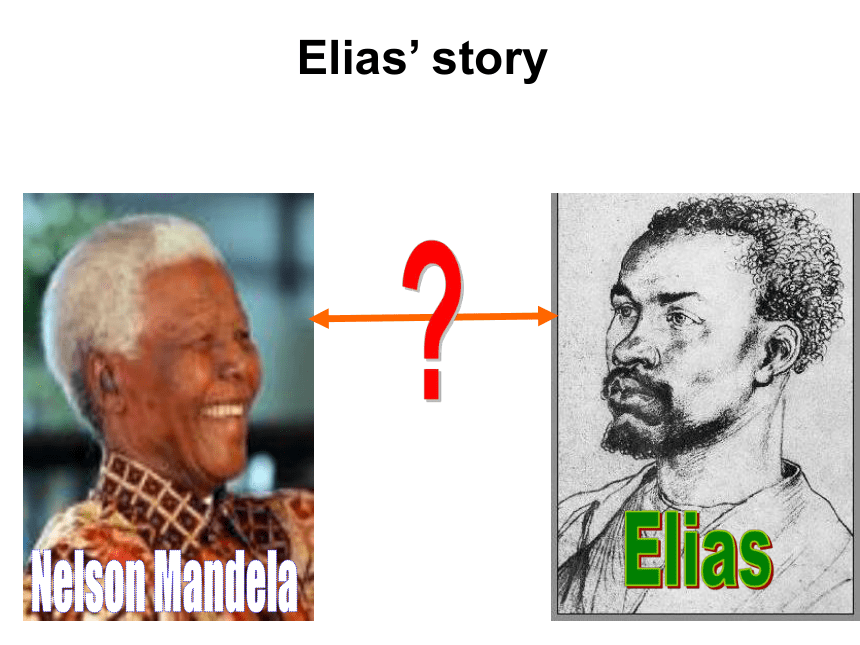
文档简介
课件17张PPT。1. 律师
2. 指导,领导
3. 法律的,依照法律的
4. 会费,学费等
5.舞台,阶段,时期
6.乐意的,愿意的
7.不公正的,不公平的
8.暴力,暴行1.lawyer n.
2.guidance n.
3.legal adj.
4.fee n.
5.stage n.
6.willing adj.
7.unfair adj.
8.violence n.
Words and expressions: 9.vote v.&n.
10.attack vt.
11.equal adj.
12.out of work
13.as a matter of fact
in fact / actually
14.in trouble
15.turn to
9.投票,选举
10.进攻,攻击
11.平等的
12.失业
13.事实上
14.在危险、痛苦等处境中 15.求助于Teaching objectives:
Knowledge goal
Learn some useful words and expressions in this unit.
Ability goal
Develop the students’ reading skills of scanning and skimming.
Emotional goal
1.?To motivate the students’ interest in learning English.
2.?To arouse the students’ love to Nelson Mandela and learnt some good qualities from him.
Nelson Mandela Nelson Mandela fought for the black people and was in prison for thirty years.
In 1993,he won the Nobel Peace Prize.In 1994, he became President of South Africa.
He devoted himself to helping the black people to get the same rights as white people.
?Elias’ storyFast reading Please divide the passage into two parts according to the main idea of each part.Part I(Paragraphs )
Elias’ life before he met Nelson Mandela.1-2Part II(Paragraphs )
The change of Elias’ life after he met Nelson Mandela and what Mandela did.3-5Reading tip:
Don’t read the whole passage
word for word
but read the first paragraph and the first
sentence of the other paragraphs.
The passage was written in order(顺序) of . timeDetailed readingElias’ life (Paragraphs 1--2)
was bornbegan schoolleft schoolworked in a gold minewent to Mandela for adviceno school fees or bus fareno passbookworried about …
out of workElias’ life (Paragraphs 1--2)
Conclusion(结论):
The time when I first met Nelson Mandela was a very difficult period of my life.
What did Elias feel before he met Mandela?
worried and hopeless.
Read paragraph 3 and find out two adjectives (形容词)to describe Elias’ feelings after he met Mandela.happy
hopefultold him how to get the correct papers… so …could stayjoined the ANC Youth LeagueBlack people’s life (Paragraph 4)
Black people could not .
Black people could not .
The places where they lived were
.
The places outside the towns where they were sent
to live were .
No black people could there.
Conclusion:
The last thirty years have seen the greatest
number of laws stopping our rights and progress , until today we have reached a stage where we have almost no rights at all. vote or choose their leadersget the job they wanteddecided by the white peoplethe poorest parts of South Africa grow food unfairWe were put into a position in which we had either to accept we were less important, or fight the government. We chose to attack the laws. We first broke the law in a way which was peaceful; when this was not allowed…only then did we decide to answer violence with violence. Why did they decide to answer violence with
violence?
Read paragraph 5 and answer:
1.How did they answer violence with violence?
2.Was it dangerous to do it? If so, why did they do that?
1.Blow up some government buildings
2.Achieve the dream of making black and white people equal.
After-readingDiscussion(work in pairs and discuss with your partner.)What qualities does Mandela have?In my opinion, Mandela is a …person.
You may use the following expression:(helpful, warm-hearted, friendly, brave, and determined…)What qualities does Mandela have?Mandelakindhelpful determinedgenerousselflessbraveConclusion: Mandela is a great person everyone should learn from.Group work: Interview Work in groups of four. One is Elias, and the other three are reporters. Each reporter will ask Elias at least one question.A: a reporter B: Elias
Examples:
A:Nice to meet you, Elias. I’m a reporter …
B: Nice to meet you too.
A: May I ask you some questions?
….. ……
A: Can you tell me about you before you met Mandela?
A:Can you tell me how Mandela helped you?
A: What do you think of Mandela?
A: Can you tell me what the black people’s life was like at that time?
Homework:1.Find out all the sentences including the attributive clauses in the text.
2.Rewrite the passage into a short story in your own words in the third person(120---150.)
2. 指导,领导
3. 法律的,依照法律的
4. 会费,学费等
5.舞台,阶段,时期
6.乐意的,愿意的
7.不公正的,不公平的
8.暴力,暴行1.lawyer n.
2.guidance n.
3.legal adj.
4.fee n.
5.stage n.
6.willing adj.
7.unfair adj.
8.violence n.
Words and expressions: 9.vote v.&n.
10.attack vt.
11.equal adj.
12.out of work
13.as a matter of fact
in fact / actually
14.in trouble
15.turn to
9.投票,选举
10.进攻,攻击
11.平等的
12.失业
13.事实上
14.在危险、痛苦等处境中 15.求助于Teaching objectives:
Knowledge goal
Learn some useful words and expressions in this unit.
Ability goal
Develop the students’ reading skills of scanning and skimming.
Emotional goal
1.?To motivate the students’ interest in learning English.
2.?To arouse the students’ love to Nelson Mandela and learnt some good qualities from him.
Nelson Mandela Nelson Mandela fought for the black people and was in prison for thirty years.
In 1993,he won the Nobel Peace Prize.In 1994, he became President of South Africa.
He devoted himself to helping the black people to get the same rights as white people.
?Elias’ storyFast reading Please divide the passage into two parts according to the main idea of each part.Part I(Paragraphs )
Elias’ life before he met Nelson Mandela.1-2Part II(Paragraphs )
The change of Elias’ life after he met Nelson Mandela and what Mandela did.3-5Reading tip:
Don’t read the whole passage
word for word
but read the first paragraph and the first
sentence of the other paragraphs.
The passage was written in order(顺序) of . timeDetailed readingElias’ life (Paragraphs 1--2)
was bornbegan schoolleft schoolworked in a gold minewent to Mandela for adviceno school fees or bus fareno passbookworried about …
out of workElias’ life (Paragraphs 1--2)
Conclusion(结论):
The time when I first met Nelson Mandela was a very difficult period of my life.
What did Elias feel before he met Mandela?
worried and hopeless.
Read paragraph 3 and find out two adjectives (形容词)to describe Elias’ feelings after he met Mandela.happy
hopefultold him how to get the correct papers… so …could stayjoined the ANC Youth LeagueBlack people’s life (Paragraph 4)
Black people could not .
Black people could not .
The places where they lived were
.
The places outside the towns where they were sent
to live were .
No black people could there.
Conclusion:
The last thirty years have seen the greatest
number of laws stopping our rights and progress , until today we have reached a stage where we have almost no rights at all. vote or choose their leadersget the job they wanteddecided by the white peoplethe poorest parts of South Africa grow food unfairWe were put into a position in which we had either to accept we were less important, or fight the government. We chose to attack the laws. We first broke the law in a way which was peaceful; when this was not allowed…only then did we decide to answer violence with violence. Why did they decide to answer violence with
violence?
Read paragraph 5 and answer:
1.How did they answer violence with violence?
2.Was it dangerous to do it? If so, why did they do that?
1.Blow up some government buildings
2.Achieve the dream of making black and white people equal.
After-readingDiscussion(work in pairs and discuss with your partner.)What qualities does Mandela have?In my opinion, Mandela is a …person.
You may use the following expression:(helpful, warm-hearted, friendly, brave, and determined…)What qualities does Mandela have?Mandelakindhelpful determinedgenerousselflessbraveConclusion: Mandela is a great person everyone should learn from.Group work: Interview Work in groups of four. One is Elias, and the other three are reporters. Each reporter will ask Elias at least one question.A: a reporter B: Elias
Examples:
A:Nice to meet you, Elias. I’m a reporter …
B: Nice to meet you too.
A: May I ask you some questions?
….. ……
A: Can you tell me about you before you met Mandela?
A:Can you tell me how Mandela helped you?
A: What do you think of Mandela?
A: Can you tell me what the black people’s life was like at that time?
Homework:1.Find out all the sentences including the attributive clauses in the text.
2.Rewrite the passage into a short story in your own words in the third person(120---150.)
